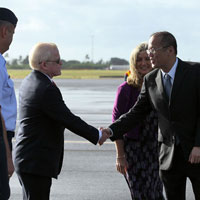HONOLULU — Leaders of the Asia-Pacific Economic Cooperation (APEC) forum said here Sunday that they are committed to building a seamless regional economy through a host of joint efforts.
“In APEC this year, we have committed to taking concrete steps toward a seamless regional economy, in order to link our economies and markets ever closer together, to the benefit of all,” said “The Honolulu Declaration — Toward a Seamless Regional Economy,” which was posted on APEC’s official website.

AQUINO IN HONOLULU. President Benigno Simeon Aquino III is welcomed by Philippine Ambassador to the United States Jose Cuisia, Jr., upon arrival at the Hickam Air Force Base in Honolulu, Hawaii, USA for the 19th Asia-Pacific Economic Cooperation (APEC) Leaders’ Meeting Saturday (November 12).
“We meet at a time of uncertainty for the global economy. Growth and job creation have weakened in many economies, and significant downside risks remain, including those arising from the financial challenges in Europe and a succession of natural disasters in our region,” noted the document.
“These challenges have only strengthened our commitment to cooperation as the way forward. Building on the Yokohama Vision, we firmly resolve to support the strong, sustained, and balanced growth of the regional and global economy,” said the statement.
Leaders of the 21-member APEC said that they recognized that further trade liberalization was essential to achieving a sustainable global recovery in the aftermath of the global recession of 2008-2009.
Philippine President Benigno S. Aquino and the 20 other member economies of the Asia Pacific Economic Cooperation (APEC) pledged their commitment by taking concrete steps to advance their shared green growth objectives.
“We can and must address both the region’s economic and environmental challenges by speeding the transition toward a global low-carbon economy in a way that enhances energy security and creates new sources of economic growth and employment,” the 21 APEC leaders said in the APEC Declaration issued on Sunday (Monday in Manila) at the conclusion of the 2011 APEC Leaders’ Meeting at the JW Marriott Hotel here.
The APEC leaders noted that they have advanced these objectives significantly this year saying that in 2012, economies will work to develop an APEC list of environmental goods that directly and positively contribute to green growth and sustainable development objectives, “on which we are resolved to reduce by the end of 2015 our applied tariff rates to 5 percent or less, taking into account economies’ economic circumstances, without prejudice to APEC economies’ positions in the World Trade Organization (WTO).”
They also said that economies will also eliminate non-tariff barriers, including local content requirements that distort environmental goods and services trade.
“Taking these concrete actions will help our businesses and citizens access important environmental technologies at lower costs, which in turn will facilitate their use, contributing significantly to APEC’s sustainable development goals,” the APEC leaders said.
To promote their green growth goals, the 21 APEC leaders agreed to take the following steps:
— Rationalize and phase out inefficient fossil-subsidie that encourage wasteful consumption, while recognizing the importance of providing those in need with essential energy services, and set up a voluntary reporting mechanism on progress, which APEC member economies will review annually;
— Aspire to reduce APEC’s aggregate energy intensity by 45 percent by 2035;
— Promote energy efficiency by taking specific steps related to transport, buildings, power grids, jobs, knowledge sharing, and education in support of energy-smart low-carbon communities;
— Incorporate low-emissions development strategies into their economic growth plans and leverage APEC to push forward this agenda, including through the Low-Carbon Model Town and other projects; and
— Work to implement appropriate measures to prohibit trade in illegally harvested forest production and undertake additional activities in APEC to combat illegal logging and assorted trade.



 ShareThis
ShareThis